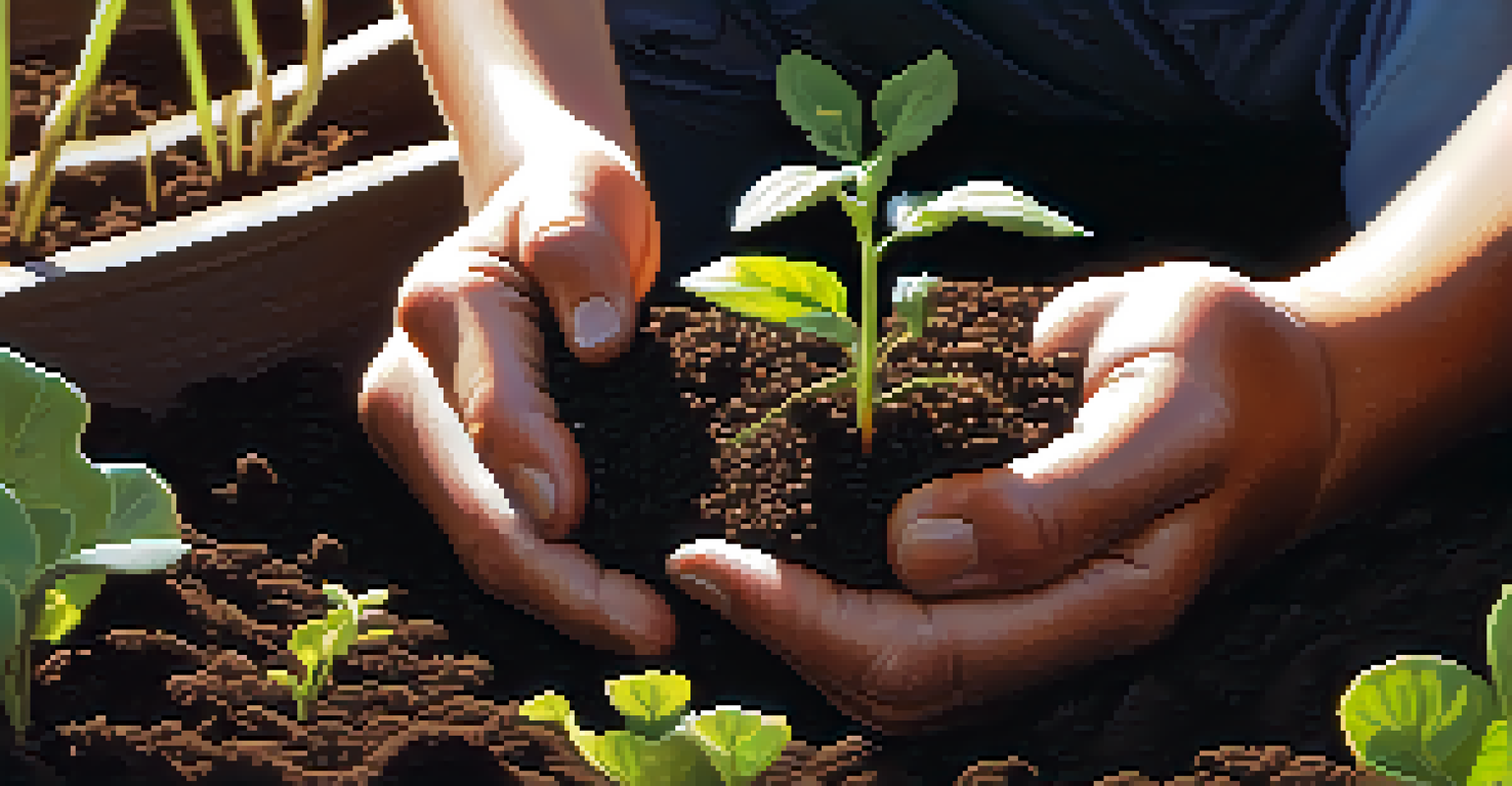The Psychological Impact of Gardening in Community Settings

Gardening as a Form of Therapy in Communities
Gardening has long been recognized for its therapeutic benefits, especially in community settings. The act of planting and nurturing plants can foster a sense of purpose and accomplishment, which is crucial for mental well-being. When individuals engage in gardening together, it promotes a feeling of belonging, alleviating feelings of loneliness and anxiety.
Gardening is a way of showing that you believe in tomorrow.
Consider a community garden where people from diverse backgrounds come together to cultivate vegetables and flowers. This shared experience not only allows individuals to connect with nature but also to connect with each other. As they work side by side, conversations flow, friendships blossom, and a supportive network forms, significantly enhancing their mental health.
Moreover, the rhythmic motions of digging, planting, and weeding can serve as a form of mindfulness, helping participants to stay present and focused. This meditative aspect of gardening helps to reduce stress levels, making it an effective tool for managing mental health challenges.
Building Social Connections Through Gardening
One of the most profound impacts of community gardening is its ability to build social connections. In a world where digital interactions often replace face-to-face communication, community gardens provide a refreshing alternative. They serve as gathering spaces where individuals can share experiences, knowledge, and resources, fostering a sense of camaraderie.

Imagine a group of neighbors who initially only exchanged pleasantries now working together to create a thriving garden. Over time, they develop relationships that extend beyond the garden, sharing meals, celebrations, and support during tough times. These connections can be particularly vital for individuals who may feel isolated or marginalized.
Gardening Enhances Mental Health
Engaging in community gardening fosters a sense of purpose and mindfulness, significantly improving mental well-being.
The simple act of sharing gardening tips or harvesting produce together can lead to deeper conversations and friendships. This social aspect of gardening not only enhances the gardening experience but also contributes to overall community resilience and cohesion.
The Role of Nature in Mental Well-Being
Interactions with nature have been shown to have a positive impact on mental health. Community gardens provide an excellent opportunity for individuals to immerse themselves in a natural environment, which can be especially beneficial in urban areas. Studies suggest that spending time in green spaces can reduce symptoms of depression and anxiety while promoting overall emotional health.
To plant a garden is to believe in tomorrow.
Gardening allows participants to engage all their senses, from the vibrant colors of flowers to the earthy scents of soil. This sensory engagement can evoke positive memories and feelings, creating a calming and restorative experience. When people dig their hands into the soil, they often feel a deep connection to the earth, which can be grounding and reassuring.
Moreover, the act of growing plants can instill hope and optimism, as individuals witness their hard work come to fruition. This cycle of planting, nurturing, and harvesting serves as a powerful metaphor for personal growth and resilience, reinforcing the idea that positive change is possible.
Gardening: A Tool for Education and Empowerment
Community gardens are not just about growing plants; they are also platforms for education and empowerment. Many gardens offer workshops and programs that teach participants about sustainable gardening practices, nutrition, and environmental stewardship. This educational aspect can foster a sense of agency and competence among community members.
For instance, a community garden might host a workshop on composting, encouraging participants to take an active role in reducing waste. As they learn new skills and apply them in their gardening practices, individuals gain confidence and a sense of achievement. This empowerment can translate into other areas of their lives, promoting self-efficacy and resilience.
Building Connections Through Nature
Community gardens serve as social hubs, helping individuals form meaningful relationships and combat isolation.
Additionally, the knowledge gained from community gardening can be shared among participants, creating a culture of learning and collaboration. This exchange of information not only enhances individual skills but also strengthens the community as a whole, fostering a sense of shared ownership and pride.
Reducing Stress Through Gardening Activities
Engaging in gardening activities can significantly reduce stress levels. The physical effort involved in planting, weeding, and watering provides a natural outlet for stress relief. As participants focus on their gardening tasks, they often find themselves in a state of flow, where worries and distractions fade away.
Moreover, the act of nurturing plants can be incredibly calming. Many people find that tending to greenery allows them to express their emotions and decompress after a long day. This hands-on approach to stress management can be particularly beneficial for individuals who may struggle with traditional forms of relaxation, such as meditation or yoga.
Gardening also encourages the practice of patience, as participants learn to wait for their plants to grow and flourish. This emphasis on the slower pace of nature can be a refreshing counterbalance to the fast-paced demands of modern life, ultimately leading to a more balanced emotional state.
Fostering a Sense of Achievement and Purpose
Community gardening provides individuals with a tangible sense of achievement that can greatly enhance their mental well-being. The process of seeing plants grow from seeds to full bloom or harvest creates a rewarding cycle of accomplishment. This sense of purpose is particularly essential for individuals who may struggle to find meaning in their daily lives.
For example, a participant who diligently cares for a patch of tomatoes may feel immense pride when they finally harvest their fruits. This small victory can boost self-esteem and motivate individuals to take on other challenges, both in gardening and in life. This reinforcement of accomplishment is a powerful aspect of the psychological benefits of gardening.
Empowerment Through Gardening Education
Workshops in community gardens empower participants with skills and knowledge, enhancing their confidence and community resilience.
Additionally, the communal aspect of gardening amplifies these feelings of achievement. Celebrating collective successes, such as a bountiful harvest shared among neighbors, helps to create a positive feedback loop, encouraging continued participation and engagement in the community.
Incorporating Mindfulness Practices into Gardening
Mindfulness is a powerful tool for enhancing mental health, and gardening naturally lends itself to this practice. By focusing on the present moment while tending to plants, individuals can cultivate a sense of mindfulness that fosters emotional well-being. Each gardening task, whether it’s pruning, watering, or simply observing, offers an opportunity to engage fully with the experience.
For instance, taking a moment to breathe in the fresh air while feeling the soil between your fingers can ground you in the present. This focus can help to quiet racing thoughts and reduce anxiety, allowing individuals to cultivate a greater sense of calm and clarity. Over time, these mindful moments can lead to lasting changes in overall mental health.

Moreover, community gardens can create a shared space for mindfulness practices. Group activities like guided meditations or nature walks can enhance the collective experience, promoting a deeper connection to both nature and each other. This integration of mindfulness into gardening can create a supportive environment for mental health growth.